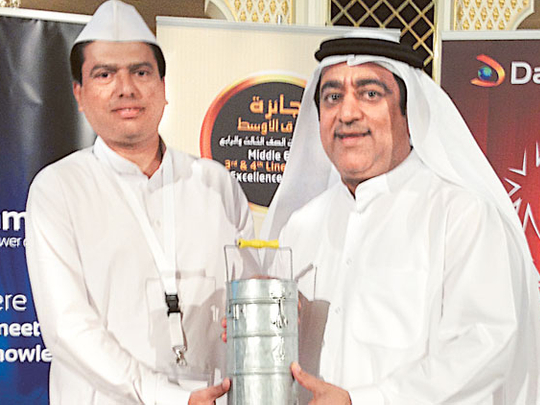
Dubai: They have attracted attention from the likes of Sir Richard Branson and Bipasha Basu, they have been honoured by Prince Charles of Britain, they have been featured in countless television documentaries, they have been awarded six sigma ratings for best management and now its Dubai’s turn to celebrate the humble dabbawalas (delivery boys) of Mumbai, who bring thousands of Mumbaikars food on time, every time.
Believe it or not, with 5,000 workers, 200,000 customers, 400,000 transactions per day, no accountant, no manager and virtually no errors; Mumbai’s celebrated dabbawalas are a marvel that is hard to believe. No wonder they have been featured in television series Ripley’s Believe It Or Not.
On Tuesday, they were featured in a leadership conference in Dubai’s most famous hotel, Burj Al Arab, where a spokesperson for the association that runs the unique enterprise took business executives and government officials through the nitty-gritties of their daily operations.
“We don’t use technology, because we don’t need to use it. Technology may fail but our dabbawalas don’t, come rain or sunshine they are on time, every time,” enthused Arvind Talekar, a spokesperson for Nutan Mumbai Tiffin Box Suppliers Charity Trust.
Talekar was addressing business and government leaders at 3rd UAE Government Organisations 3rd and 4th Line Leaders Development Conference, where a visibly amazed audience wondered how a bunch of mostly illiterate individuals run a gigantic supply chain industry, without any modern amenities or infrastructure.
“The only technology we use is Mumbai’s lifeline, the local trains, without which we wouldn’t been able to carryout such a huge task. Most people in Mumbai are dependent on the trains because it is the most efficient medium with great connectivity and the city is so vast, its virtually impossible to move quickly without trains,” said Talekar, who is a third generation member of his family to be associated with the delivery business.
He says, like him, around 80 per cent of dabbawalas, have a long-standing link to the service, with sons taking over from fathers and grandfathers.
It is a story of time-tested values of hard work, commitment and punctuality that started more than 120 years ago and continues till date with great success.
“It was started by Mahadev Bache in 1890 and later registered as a charitable trust in 1956. The trust has grown from one man to an organisation of 5,000, who are mostly descendants of old dabbawalas and it’s in our blood to serve people honestly,” opined Talekar.
The daily operations begin around 9am in the morning, when individual dabbawalas go to the homes of their customers to pick their tiffin boxes. Each dabbawala carries around 40 tiffins at a time in wooden crates mounted on the head or on bicycles or hand-pulled carts.
The tiffins are then delivered to the nearest railway stations, where a group of dabbawalas sort the tiffins according to their destinations and deliver to the customer at his work place before 12.30pm.
Each tiffin is coded with a unique combination of alpha-numericals and handled by six-seven dabbawalas on the way to its destination.
The entire city Mumbai is divided according railways stations in the vicinity, with each station manned by 20 dabbawalas and a supervisor, who manages the affairs at the designated station and stands in, in case of an absence.
The Guinness record holding enterprise covers a distance of 70 kilometres and takes break for a week only once in a year.
The enterprise as a whole is non-profitmaking, while each dabbawala earns a salary of around Rs9,000 (Dh600) to Rs11,000 (Dh730) per month.
“It is wonderful story of hardwork, grit and passion. As business leaders it teaches us a lot of lessons in time management, hard work etc. It also shows that you don’t necessarily have to go to big business schools to learn business, you can learn from anywhere if you actually wants to learn,” said Ali Al Kamali, Managing Director of Datamatrix, who organised the conference.








